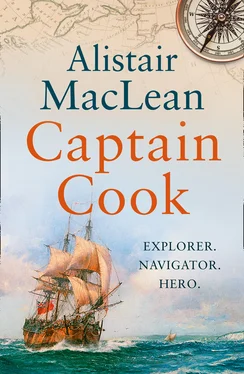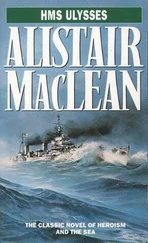His apprenticeship over, Cook left the Walkers, spent over two years in the East Coast and Baltic trade, then was asked by the Walker brothers to return to them and become mate of their vessel the Friendship . Cook accepted. Three years later, in 1755, he was offered the command of the Friendship . Cook declined. Instead, he joined the Royal Navy as an able seaman.
This extraordinary decision does two things: it points up a fact and raises a question. The fact is that, to have been offered a command at the age of twenty-seven, Cook must have impressed the owners with his qualities as a seaman, a navigator and a leader of men, which is perhaps not surprising when one considers the quite extraordinary lengths to which he was going to develop those already marked abilities – and that of the practice of cartography – in the years to come. But what is surprising is that he passed up the command of a merchant ship for the lowest rank of a naval vessel.
As with so many of his decisions, Cook himself has offered no explanation for this one. (Cook was an intensely secretive man – in his wanderings over the world his officers frequently complained that they never knew where they were going until they got there.) It is generally assumed that it was directly connected with the frantic re-arming taking place in Britain and France in preparation for the inevitable approach of what, the following year, was to be the beginning of the bitter and bloody Seven Years’ War: active fighting was already taking place in overseas territories, especially in North America, where Britain and France had already abandoned all pretence of diplomatic negotiations as a means of settling the question of colonial supremacy: already, although it was still nominally peace-time, the British Navy had instituted a tight blockade of the French coast to prevent further supplies of men and arms from reaching the French in Canada.
Because of a Navy that had been allowed to become rundown and depleted and because of the imminence of war, British shipyards were turning out naval vessels at an unprecedented rate. Ships need crews and the young men of that day and age were markedly reluctant to volunteer for this honour, an unwillingness that is no cause for surprise when one considers the brutal conditions of life in the Royal Navy of the mid-eighteenth century. They had to be persuaded to man those empty vessels and as recruiting posters weren’t very much in vogue at that time persuasion usually took the form of forcible abduction, by heavily-armed naval press-gangs, of any able-bodied man, drunk or sober, who was so unfortunate as to cross their path. It has been suggested that Cook volunteered so as to avoid being press-ganged, but, apart from the fact that it seems totally out of character with the man, it is incredible that a merchant navy officer – and Cook could have been a captain, had he so wished – would have been press-ganged without being released, with apologies, the moment his identity was known.
Perhaps he was a romantic who could hear the far-off sound of drums and bugles. Perhaps his patriotism was of less euphoric nature, a combination of conscience and commonsense that told him it was not only his duty but also prudent to smite the French before they smote him. Perhaps – this is the most commonly suggested explanation and an uncommonly cynical one it is too – Cook figured that with so many ships being built and with the certainty of so many men being killed in the now inevitable war, promotion was bound to be rapid. Perhaps he was just tired of the eternal coal dust. Perhaps anything. We shall never know. All that we know with certainty is that he joined the Navy on 17 June 1755, and eight days later was assigned to the Eagle , a sixty-gun ship of the line lying at Portsmouth.
The Eagle in turn was assigned to the blockade of the French coast. As he was from then on to do faithfully for the rest of his life, Cook kept a day-to-day log, but it makes for rather less than dramatic and inspirational reading. He mentions such things as watch changes, conditions of the food and drink, gives us weather reports, speaks of patrols, sighting and investigating ships, hum-drum details which after two centuries can hold no interest for us because, as ever, they tell us nothing of the man himself.
Only two things of any note occurred in his first few months on the Eagle . Within a month of joining, he had become master’s mate, indication enough of the speed with which his navigational ability, seamanship and reliability had been appreciated. Then, not long afterwards, the Eagle’s captain, an easy-going gentleman who vastly preferred the sheltered calms of Portsmouth harbour to the winter gales of the English Channel, was relieved of his command and replaced by Captain (later Sir) Hugh Palliser.
Palliser, as he was to prove, was no ordinary man. A brilliant seaman and naval tactician, held in the highest regard by his superiors, he was eventually to become Governor of Newfoundland and a Lord of the Admiralty. Even so, he might have been entirely forgotten today, his tiny niche in history obliterated by Cook’s great shadow, were it not for the fact that it was Palliser who first recognised Cook as a man of genius and destiny, who proclaimed this loud and long to all in authority who would listen and who, as his years drew in, long after Cook’s place in history was assured, was still happily proclaiming his belief in Cook’s destiny. Palliser must have been a man of quite extraordinary perception.
Cook remained on the Eagle from the summer of 1755 until the autumn of 1757 – the Seven Years’ War had begun early in 1756, but the declaration of war did no more than regularise an already existing situation. Except for occasional urgent refits – the weather in the Channel and the Bay of Biscay caused far more damage to the English men-o’-war than the French did – the Eagle spent almost all of this time blockading the French coast. It was a rather hum-drum and monotonous existence enlivened only by the first – and last – sea-fight of any importance in which Cook was to engage. In late May, 1757, they engaged a large French vessel, 1500 tons and fifty guns, off Ushant – an East Indiaman by the name of Duc d’Aquitaine . The French vessel, in a running fight lasting forty minutes, was crippled and captured: but the Eagle itself was so badly damaged that it had to return to England for repairs.
For our understanding of Cook, the significance of this period lies not in the occasional skirmishes with the enemy but in the fact that it was then that Cook polished and honed the skills, those very special skills, that were to serve him so well in the years to come. True, he was still no cartographer, his years of surveying and chart-work were yet to come: but that he had fully mastered his knowledge of ships and the sea is shown clearly by the fact that in just over two years he had advanced from able seaman to master’s mate, to boatswain and finally to master, the person in charge of the actual running of the ship and the senior non-commissioned officer on board. At the same time, he pursued his studies in navigation and mathematics (in necessary conjunction with astronomy) and as he had already been fully qualified in those subjects before he had joined the Navy the standards he had now reached must have been quite exceptional.
The mastering of those subjects was, of course, an essential prerequiste for the years in the Pacific that still lay far ahead – without them he could never have gone and the Admiralty would most certainly never have chosen him. But no less essential for the future was his exposure and conditioning to naval life itself, so different from the careless and rather slipshod way of life found aboard the colliers. Here each man was a specialist, a man trained to rely upon himself and to rely upon others, a man into whose mind it was firmly and permanently inculcated that he was a vital link in a chain and that the one unforgiveable sin, under times of stress – and Cook and his men were to undergo a much greater degree of stress in the Pacific than they had ever been subjected to in the Atlantic – was to be the one who broke that chain. Much has rightly been said about the harshness of naval discipline at the time, but overmuch misplaced emphasis has been laid on the contention that only an iron discipline could produce a highly trained crew. Only bad crews, badly officered, require this brutal kind of discipline, while good crews, good officers, all highly trained, need only the discipline that comes from within: it is clear, now and later, that this was the kind of crew Cook had in mind.
Читать дальше












